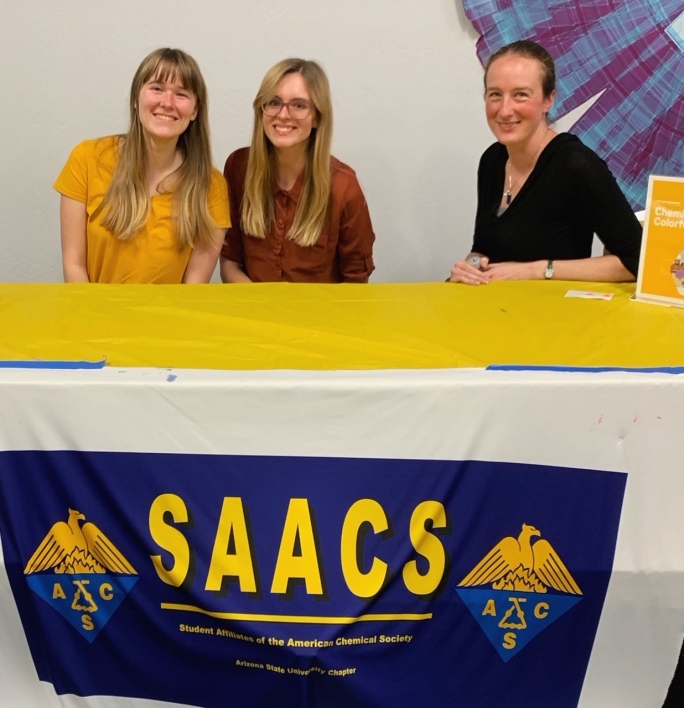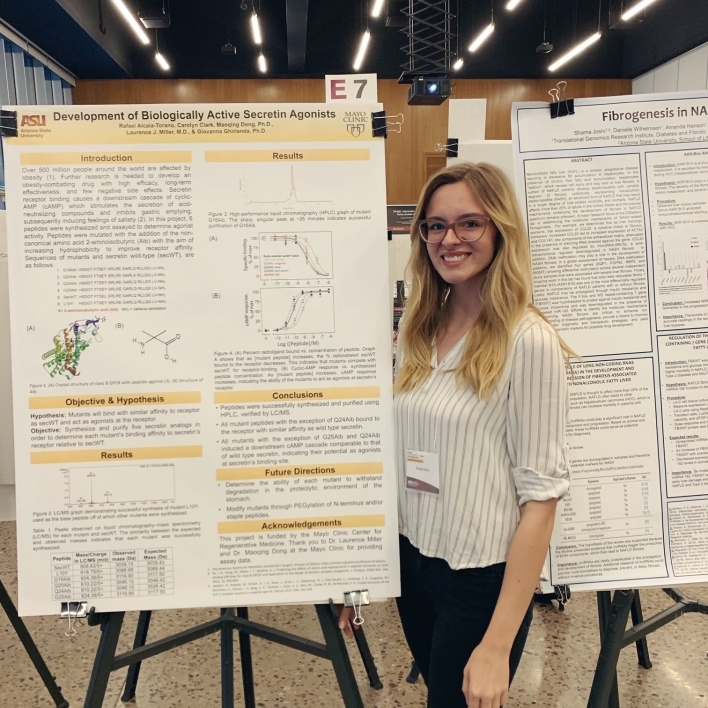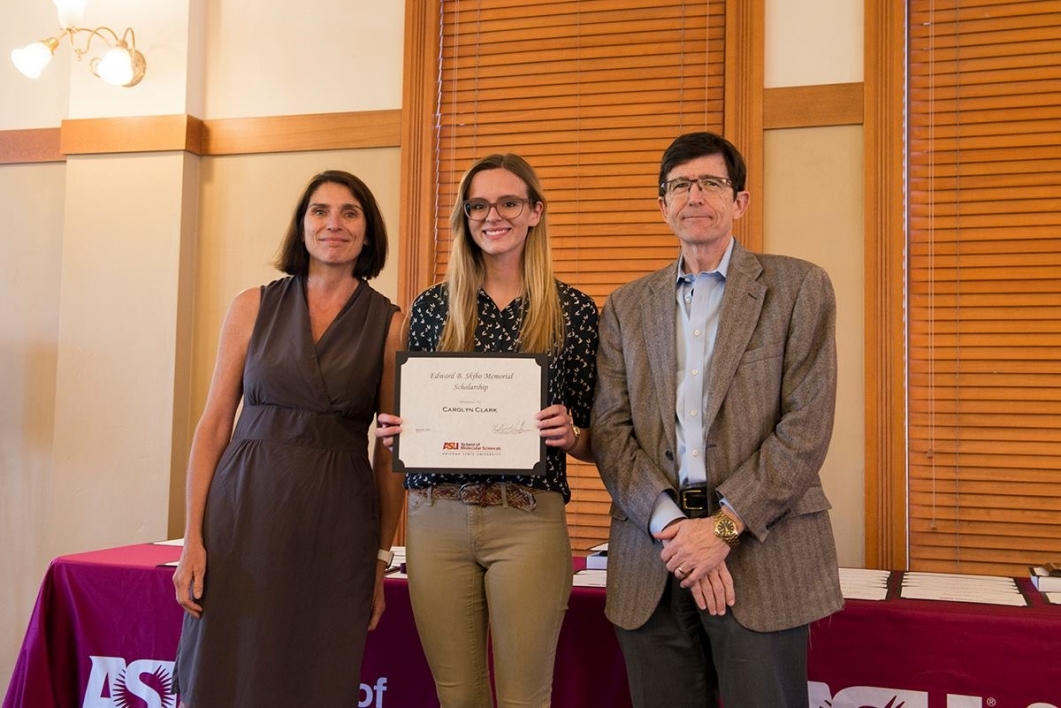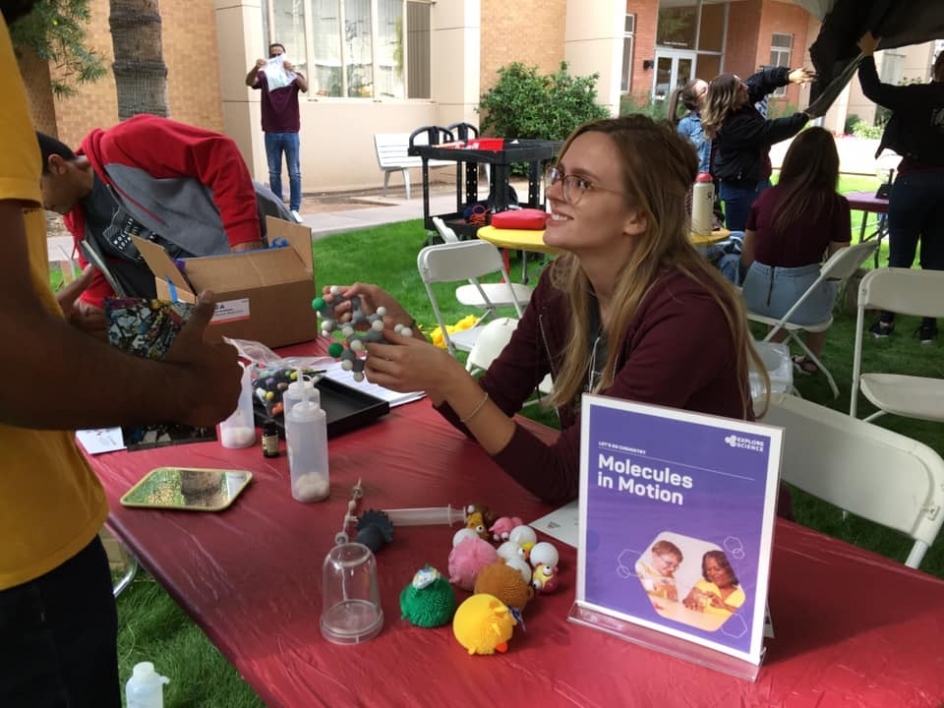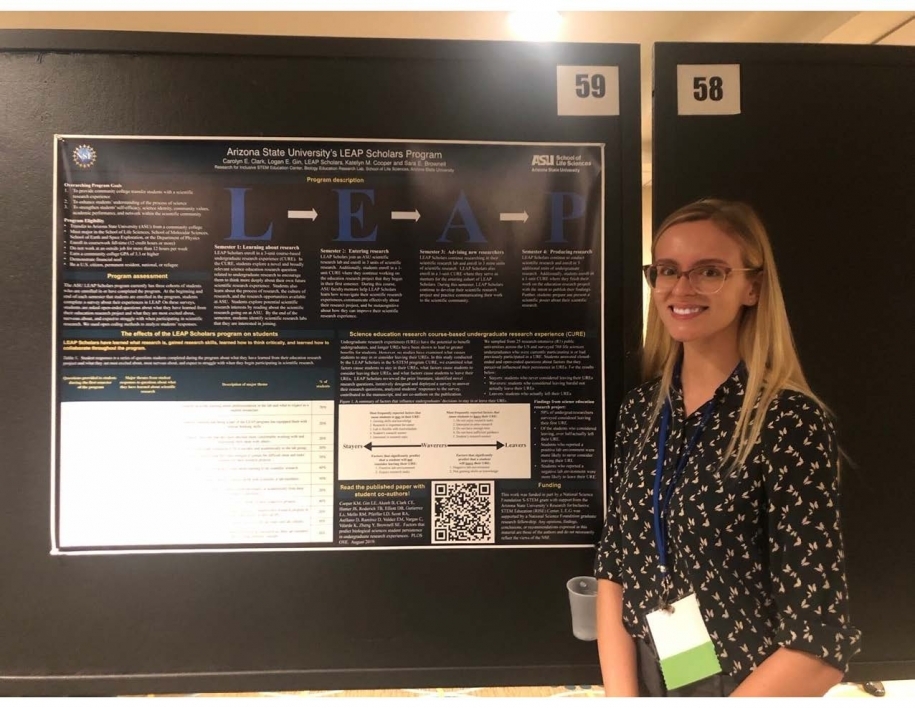LEAP Scholar awarded School of Molecular Sciences Dean’s Medal

School of Molecular Sciences Dean's Medalist Carolyn Clark
Editor’s note: This is part of a series of profiles for fall 2019 commencement.
Carolyn Clark is among a distinguished group of students to receive the 2019 fall semester Dean’s Medal from The College of Liberal Arts and Sciences at Arizona State University.
On Dec. 13, 2019, the College announced the fall 2019 Dean’s Medalists. The College recognized its most outstanding students — one from each department and each school within The College. Carolyn Clark is the Dean’s Medalist recipient from the School of Molecular Sciences.
Clark is wrapping up a double major in biochemistry with a concentration in medicinal chemistry and a minor in studio art, and she feels a sense of belonging and purpose with both degrees. While her majors seem unrelated — fulfilling her love of creating art while pursuing her passion and curiosity in the STEM fields, Clark sees them as complementary outlets to be creative in different spaces. Clark likes how the STEM field is very structured, but shares it can be stressful at times, so she sees studio art as a nice outlet not related to STEM as a stress reliever that is fun while allowing her to be creative.
“With biochemistry I like how it’s designed, because there’s a purpose for every class. Overall it’s a great department because you know everyone there,” Clark said. “In studio art, I know all the professors, and I feel like they all know me by name. It’s such a welcoming environment in both departments.”
As a transfer student, Clark shared that while coming to ASU was a big adjustment, she feels she was well prepared for the transition. Her community college experience gave her the tools to be successful. She chose ASU because it is a Research 1 school and offered many opportunities for undergraduate research.
“I transferred to ASU from Paradise Valley Community College,” she said. “And spending the first two years there it provided me with a solid foundation to continue my academics here at ASU.”
Clark is part of the LEAP scholars program (Learning about research, Engaging in research, Advising in research, and Producing research), funded by the National Science Foundation to help transfer students get involved in undergraduate research. Students receive a scholarship to participate in the program where they learn about how to maximize their research experience.
Shortly after Clark was accepted to ASU, the LEAP program helped facilitate her becoming an undergraduate researcher in Professor Giovanna Ghirlanda’s lab. Clark was attracted to working in Ghirlanda’s lab because of her background in organic chemistry and the research her lab was working on. Clark’s research project is working on synthesizing peptides and biologically active secretin agonists.
Ghirlanda, a professor of chemistry in the School of Molecular Sciences, said, “Carolyn is an exceptional student. She has spearheaded her project with drive, enthusiasm and a smile. Her project on secretin analogs identified peptides more active than the natural agent, and may result in treatment for obesity and diabetes 2. Carolyn has the lab skills and analytical thinking of a graduate student, plus empathy and warmth. She will be an excellent doctor!”
Last spring at the School of Molecular Sciences annual Spring Awards Luncheon, Ghirlanda presented Clark with the Edward Skibo Scholarship. The scholarship is awarded annually to an outstanding undergraduate student with an interest in a career in organic or medicinal chemistry.
In September 2019 Clark was invited to attend the S-STEM Symposia for the Advancement of Science symposium co-hosted by the National Science Foundation and the American Association for the Advancement of Science in Washington, D.C. While there she participated in a poster session where she presented research she did with her LEAP cohort and the Biology Education Research Lab.
That study published in PLOS ONE focused on figuring out reasons why undergraduate students choose to leave research before graduating. They surveyed over 700 undergrads from institutions around the U.S. and found that of those 700+, half of them had considered leaving undergrad research and of that half, 50% had actually left research.
“We identified ‘negative lab environment’ to be the No. 1 factor that students cited for leaving their undergraduate research experiences,” said Clark. “The goal of our work was to improve the experience of undergraduates in research by identifying where we need to improve their experiences.”
Despite her heavy academic workload, Clark has also been involved in multiple other areas of ASU life. She is president of the ASU chapter of Student Affiliates of the American Chemical Society (SAACS), in which students participate in a wide range of programs and activities doing science and chemistry outreach like Open Door and Homecoming, to get students of all ages interested in STEM, especially chemistry. Clark also is a chemistry tutor in the SMS Learning Resource Center.
After graduation, Clark will be applying to medical school in the 2020 cycle and in May she will be traveling to Honduras to volunteer with Global Brigades. She joined Global Medical Brigades because of her desire to make an impact on the lives of people living in Honduras who have limited access to health care, water and facilities. While Clark is in Honduras she will have the opportunity to take vitals and patient history in triage, shadow licensed doctors in medical consultations, and assist in a pharmacy under the direction of licensed pharmacists.
“I am motivated by my female mentors and peers whose intelligence and passion for science inspire me every day,” said Clark who will earn her bachelor’s degrees in December 2019.
More Science and technology

Applied Materials invests in ASU to advance technology for a brighter future
For nearly 60 years, global giant Applied Materials has been hard at work engineering technology that continues to change how…

Meet ASU engineering students who are improving health care, computing and more
Furthering knowledge of water resource management, increasing the efficiency of manufacturing point-of-care health diagnostic…

Turning up the light: Plants, semiconductors and fuel production
What can plants and semiconductors teach us about fuel production?ASU's Gary Moore hopes to find out.With the aim of learning how…


